DFM/UW Environment Statement - University of Wisconsin–Madison
advertisement
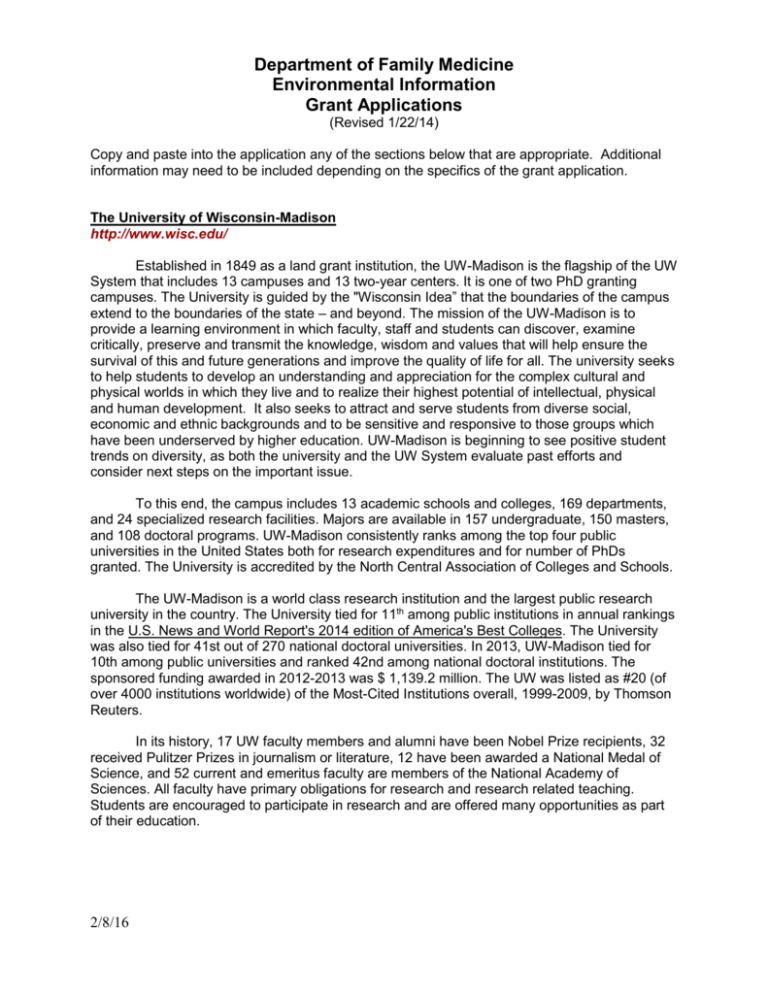
Department of Family Medicine Environmental Information Grant Applications (Revised 1/22/14) Copy and paste into the application any of the sections below that are appropriate. Additional information may need to be included depending on the specifics of the grant application. The University of Wisconsin-Madison http://www.wisc.edu/ Established in 1849 as a land grant institution, the UW-Madison is the flagship of the UW System that includes 13 campuses and 13 two-year centers. It is one of two PhD granting campuses. The University is guided by the "Wisconsin Idea” that the boundaries of the campus extend to the boundaries of the state – and beyond. The mission of the UW-Madison is to provide a learning environment in which faculty, staff and students can discover, examine critically, preserve and transmit the knowledge, wisdom and values that will help ensure the survival of this and future generations and improve the quality of life for all. The university seeks to help students to develop an understanding and appreciation for the complex cultural and physical worlds in which they live and to realize their highest potential of intellectual, physical and human development. It also seeks to attract and serve students from diverse social, economic and ethnic backgrounds and to be sensitive and responsive to those groups which have been underserved by higher education. UW-Madison is beginning to see positive student trends on diversity, as both the university and the UW System evaluate past efforts and consider next steps on the important issue. To this end, the campus includes 13 academic schools and colleges, 169 departments, and 24 specialized research facilities. Majors are available in 157 undergraduate, 150 masters, and 108 doctoral programs. UW-Madison consistently ranks among the top four public universities in the United States both for research expenditures and for number of PhDs granted. The University is accredited by the North Central Association of Colleges and Schools. The UW-Madison is a world class research institution and the largest public research university in the country. The University tied for 11th among public institutions in annual rankings in the U.S. News and World Report's 2014 edition of America's Best Colleges. The University was also tied for 41st out of 270 national doctoral universities. In 2013, UW-Madison tied for 10th among public universities and ranked 42nd among national doctoral institutions. The sponsored funding awarded in 2012-2013 was $ 1,139.2 million. The UW was listed as #20 (of over 4000 institutions worldwide) of the Most-Cited Institutions overall, 1999-2009, by Thomson Reuters. In its history, 17 UW faculty members and alumni have been Nobel Prize recipients, 32 received Pulitzer Prizes in journalism or literature, 12 have been awarded a National Medal of Science, and 52 current and emeritus faculty are members of the National Academy of Sciences. All faculty have primary obligations for research and research related teaching. Students are encouraged to participate in research and are offered many opportunities as part of their education. 2/8/16 The University of Wisconsin School of Medicine and Public Health (SMPH) http://www.med.wisc.edu/ The UW School of Medicine and Public Health was envisioned in 1848 when Governor Nelson Dewey included a medical school in his plan for the newly created University of Wisconsin. In 1908, eight students matriculated in the new College of Medicine at the University of Wisconsin. The two-year curriculum consisted entirely of basic science classes. A handful of faculty members - either "borrowed" from the College of Letters and Science or recently hired for the new college - taught the students anatomy, physiology, physiological chemistry, pathology and pharmacology. From those humble beginnings and in an eventful span of a little more than 100 years, the UW School of Medicine and Public Health has evolved and broadened its scope to include programs in public health, physical therapy, physician assistant and genetic counseling. These programs have consistently achieved high acclaim and supply needed health professionals to Wisconsin and beyond.. The UW School of Medicine and Public Health is recognized as an international, national and statewide leader in education, research and service. More than a century since our founding as the University of Wisconsin Medical School, we are transforming into the nation's first School of Medicine and Public Health, as we integrate the principles and power of traditional medical and public health approaches in all of our missions. The School of Medicine and Public Health has a long tradition of rapidly translating discovery into application, and we believe there are important synergies in our tripartite missions of patient care, education and research. The University of Wisconsin-Madison is consistently ranked among the very top research institutions in the country, and our faculty, staff and students enjoy collaborations and interactions with the full range of schools, colleges and centers on the beautiful lakeside Madison campus. The University of Wisconsin School of Medicine and Public Health offers students, educators and researchers access to all of the benefits of a preeminent public research university. In addition, the school has strong partnerships with the University of Wisconsin Hospital and Clinics, whose programs are consistently ranked among the best in the nation; and the University of Wisconsin Medical Foundation, one of the 10 largest physician practice groups in the country. These relationships afford students, teachers and researchers opportunities available only at top ranked academic medical centers. Additional SMPH information: About us: http://www.med.wisc.edu/about/main/35 The UW Institute for Clinical and Translational Research (ICTR) http://www.ictr.wisc.edu/ ICTR is headquartered in Madison, and collaborates with its partner Marshfield Clinic and numerous other member sites across Wisconsin. The ICTR has major funding from a 2007 NCRR/NIH Clinical and Translational Science Award. Its goal is to transform research into a continuum from investigation through discovery to translation into real-life community practice, thereby linking the most basic research to practical improvements in human health. 2/8/16 University of Wisconsin (UW) Clinical and Translational Research Center (CTRC) http://www.ictr.wisc.edu/node/22 Supported by the NIH through a Clinical and Translational Science Award, the CTRC’s mission is to offer an optimal setting for investigators to conduct safe, controlled state-of-the-art research. The Center has provided excellent services to the research community of the UW. It is centrally located, with free parking, and is easily accessed by car or bus. The Center, located within the UW Hospital and Clinics, provides personnel, supplies and equipment support necessary to perform high quality clinical research. The CTRC recently expanded to 18 inpatient and outpatient rooms in its 6th floor center with a core staff of highly-trained research nurses and a sample processing facility. The CTRC is the hub for federally-funded, investigator-initiated, and industry studies that need the in-hospital location, safety and expertise of the 15-member RN, BSN, and Nurse Practitioner staff. To build the "without walls" concept, the CTRC is expanding its off-site nursing staff to serve investigators at satellite locations throughout UW Hospital, in Madison, and around the state. The UW Collaborative Center for Health Equity (CCHE) https://ictr.wisc.edu/CCHE The Collaborative Center for Health Equity (CCHE) is part of the NIH-funded UW Institute for Clinical and Translational Research, and also holds its own center grant from the National Center on Minority Health and Health Disparities. The Collaborative Center for Health Equity (CCHE) is a resource whose mission is to support health equity and health disparities research with diverse racial/ethnic communities in Wisconsin, promoting collaborations between campus- and community-based partners. CCHE works to promote underserved, minority, and immigrant health; to increase health equity and improve health outcomes; and to assist in the development of health-care providers’ and researchers’ skills in intercultural communication. Graduate Program in Clinical Investigation https://ictr.wisc.edu/GraduateProgram The Graduate Program in Clinical Investigation (GPCI), is housed in the Institute for Clinical and Translational Research. The GPCI, which includes a MS, a PhD, and a PhD Minor, is a direct response to the broadly-recognized need, most notably by the National Institutes of Health in 1998, to stimulate more clinical research and develop and promote clinical research training programs. The curriculum draws from existing courses in the various partner schools, but will also include new courses developed exclusively for the GPCI. Together, the coursework will provide a solid foundation in research methods and analysis, including biostatistics, study design, and ethical conduct. Through electives and a research requirement students will pursue their own area of specialization in patient-oriented clinical research. Community Health Connections https://ictr.wisc.edu/CommunityHealthConnections The Community Health Connections (CHC) program, part of the ICTR-CAP core, is an information gathering, research facilitation, and dissemination resource that connects researchers with communities throughout Wisconsin. It is a statewide, regionally-based infrastructure to promote ideas and community-based projects that will influence Type 2 translational research being done at the University of Wisconsin-Madison and in communities across the state. 2/8/16 Wisconsin Network for Health Research (WiNHR) https://ictr.wisc.edu/WiNHR The Wisconsin Network for Health Research (WiNHR), is a collaborative effort involving the UW School of Medicine and Public Health, Marshfield Clinic Research Foundation, Aurora Health Care, and Gundersen Lutheran Medical Foundation. WiNHR was established to promote greater interinstitutional cooperation in research and to move research results to the bedside more efficiently and effectively. The University of Wisconsin (UW) Department of Family Medicine (DFM) http://www.fammed.wisc.edu/ The UW DFM is one of the largest family medicine departments in the U.S., with five campuses in urban and rural communities throughout Wisconsin. The UW DFM is ranked by the 2014 edition of US News and World Report as the 6th best Family Medicine program in the country and has been among the top 10 since 2001. The UW DFM supports residency programs in Eau Claire, Appleton, Wausau, Madison, Milwaukee and Baraboo. The UW DFM programs are among the oldest in the country having started in 1970 as one of the first accredited residency programs in the country. Each campus teaches students, has a Family Medicine residency program and three have Rural Training Tracks. There are 105 residents in training and 130 Faculty in 8 residency and 19 community practices with approximately 447,000 annual patient visits in hospitals and clinics in 25 communities, many of them underserved, throughout the state. Through the teaching clinics, the alumni practicing in the state and the community volunteer faculty, the UW DFM touches the lives of almost half the people of Wisconsin each year. The UW DFM is committed to a program of building research capacity and research funding, and has successfully parlayed that into becoming one of the top Family Medicine departments in federal funding. The UW DFM currently has five faculty with NIH funded research programs, and administers an NIH/NCCAM fellowship for pre and post docs plus a HRSA research fellowship that serves six fellows. The 28 active grants in the department, totaling over $9.6 million, include among others: 7 NIH research grants, a DOD grant, a CDC grant, 3 HRSA academic and training grants, and 11 private, state and locally funded research grants. The department has developed a clinical data warehouse containing DFM service billing data from the last 10 years. The UW DFM is committed to the performance of peer-reviewed research and will continue to provide research support and guidance to its faculty, fellows and residents. The UW DFM research infrastructure provides support to medical students, residents, fellows and other faculty researchers. It includes consulting for research design and methodology, database support, statistical analysis, budgetary and computer support, support for the conduct of research studies, and funds from a small grant program designed to support preliminary studies that can form the basis for future externally funded larger studies. Faculty and fellows provide review of grant submissions and of articles to be submitted to peer-reviewed journals. DFM 2012-2013 Annual Report: http://www.fammed.wisc.edu/annual-report/2013 2/8/16 The University of Wisconsin (UW) Department of Population Health Sciences (DPH) http://www.pophealth.wisc.edu/ Uniquely in the School of Medicine and Public Health, the UW DPH has its focus on the health of populations. To this end, its mission is to create, integrate, disseminate and apply knowledge promoting the most efficient and effective possible use of resources to maintain and improve the public's health. The UW DPH strives for nationally recognized research excellence in integrative biology, epidemiology, disease prevention, health policy and management. A vital corollary of the research effort is the education of graduate students and post-doctoral trainees in research methods to study disease causation and prevention, assessment of medical practice and technology and the optimal organization and management of health care delivery. Finally, the UW DPH is committed to the integration and dissemination of knowledge of epidemiology, prevention and health care delivery that will enhance the understanding and effectiveness of medical students in their clinical careers. With the energy, dedication and expertise of its faculty and staff, the UW DPH accepts the challenge of leadership in addressing the major health issues. Faculty, staff, and students in the UW DPH engage in a wide variety of epidemiological and health services research projects to understand determinants of health and health problems in populations and to improve effectiveness and efficiency of healthcare. Methods employed involve developing and maintaining long term cohort studies, disease registries, population surveys, and retrospective analyses of large observational databases. Researchers in the department also work to advance methodology in health economics, population health evaluation, and statistical analyses. The University of Wisconsin (UW) Department of Pediatrics http://www.pediatrics.wisc.edu/ The Department of Pediatrics promotes the health of children and adolescents with a balanced program that seeks new knowledge through research, provides outstanding educational opportunities, delivers high quality comprehensive clinical care and service, advocates vigorously for children and adolescents, and is responsible to the changing needs of our community and society. The American Family Children's Hospital at the UW Hospital and Clinics is a six-story, 135,000 square foot, 84-bed facility that opened in August 2007. The inpatient rooms in the American Family Children's Hospital average over 250 square feet. Other areas such as classroom space, Child Life play areas, and patient/family spaces have been considerably expanded from the old building. The goal was to create a unique child-friendly architectural look and feel, an element that contributes to the healing of children. The University of Wisconsin (UW) Department of Medicine, Section of Internal Medicine http://www2.medicine.wisc.edu/home/genintmed/genintmedmain The Section of General Internal Medicine provides comprehensive primary care and diagnostic services for adults and some adolescents. The faculty members provide care at a centrally located outpatient clinic and at three satellite clinics including a Women's Health Clinic. Primary care is provided to members of a large university-based HMO, as well as to patients with private insurance, Medicare and medical assistance. Faculty members also provide medical care at the South Madison Family Health Center, which provides care to Madison's underinsured and uninsured population. All clinics use a multidisciplinary approach to care with involvement of physician assistants, nurse practitioners, RNs and behaviorists in patient care. In addition, the behavioral medicine faculty in the general medicine clinics provide psychiatric evaluation and counseling services for common psychosocial problems. Clinics in smoking cessation and HIV are offered by the Section. 2/8/16 The Section has an inpatient service at UW Hospital and provides a consultative service at UW Hospital and the Veteran's Hospital. The faculty members are a mix of clinicianeducators and clinician-researchers. Faculty members' major areas of clinical and research interest include: Smoking cessation; Women's health; Women in medicine; Preventive medicine; Syncope; Sleep apnea and hypertension; Health care outcomes and quality of life assessment; Computer applications to medicine; Psychosocial aspects of health care; Physician job satisfaction; Doctor-patient interactions; Care of underserved rural and urban populations; Medical decision making; HIV care. The Wisconsin Research and Education Network (WREN) http://www.fammed.wisc.edu/research/wren The mission of the Wisconsin Research and Education Network (WREN) is to improve health outcomes for the people of Wisconsin through education, and through promoting and conducting primary care research in partnership with primary care clinicians and the communities they serve. WREN was founded in 1987, and is one of the oldest and most respected practice-based research networks in the United States. The WREN Network is comprised of approximately 300 members, 200 of whom are practicing clinicians. WREN members are distributed across 59 communities in 34 of Wisconsin’s 72 counties. Members are affiliated with 80 different clinic sites representing 37 healthcare organizations, ranging from small independent practices to large integrated health systems. WREN members conduct high-quality translational research projects in “real-world” family practices across Wisconsin. Since 2007, WREN has participated in 36 funded projects; 13 funded by AHRQ, 7 funded by the NIH, and 16 non-federally funded projects. Since its inception in 1987, WREN projects have resulted in over 90 publications WREN maintains a core of full-support practices, contracted to participate in WREN projects on a regular basis. Each full support practice receives financial support annually to offset the costs of implementing WREN projects, as well as administrative support from a WREN Regional Research Coordinator assigned to the practice. Two WREN full support sites are located in Wisconsin’s largest city, Milwaukee; the others are located in the rural communities of Mauston, Richland Center, and Tomah. WREN staff are regionally distributed in Madison, Wisconsin Rapids area, and Milwaukee, Wisconsin. In addition to Full Support clinics, WREN has done projects with more than 50 clinics all across the state. WREN receives core funding through the UW School of Medicine and Public Health (UW SMPH) Clinical Translational Science Award (CTSA) federal grant. This provides ongoing support for dissemination and educational efforts throughout the network. WREN is part of two AHRQ funded (P 30) Research Centers in Practice-Based Research and Learning consortiums. These consortia of PBRNs form an infrastructure to accelerate the generation of new knowledge and a community of learning for primary care practices to improve quality, patient safety, and effectiveness of care. The two networks are: The Coordinated Coalition of Networks (CoCoNet2): Oklahoma, New York, Los Angeles, Wisconsin and the coordinating center Westat; and The Meta-Network Learning and Research Center (MetaLARC): Oregon, Iowa, Colorado, Quebec and Wisconsin. 2/8/16 Clinical Investigator Preparatory Pathway (CIPP) http://pubs.wisc.edu/home/archives/grad08/med/clinical.html Institutional Review Board (IRB) http://www.grad.wisc.edu/research/hrpp/irblinks.html 2/8/16
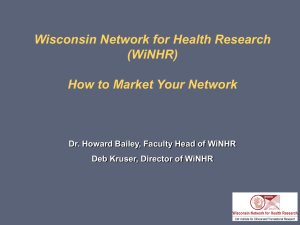


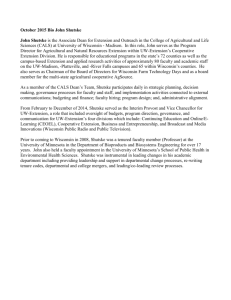

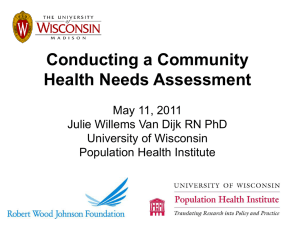
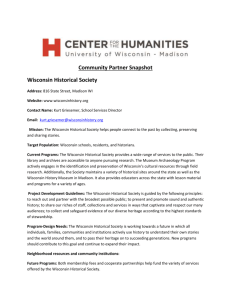

![[Company Name] Certificate of Completion](http://s2.studylib.net/store/data/005402466_1-8a11f4ced01fd5876feee99f8d8e6494-300x300.png)